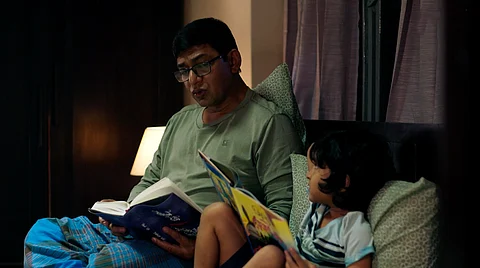
- In-Depth Stories
- Web Stories
- Reviews
- News
- FC Lists
- Interviews
- Features
- FC SpecialsFC Specials

Director: Amitabh Reza Chowdhury
Writers: Naseef Amin, Shibabrata Barman
Cast: Chanchal Chowdhury, Imtiaz Barshon, Ashok Bepari, Kazi Anisul Hoque Borun
Munshigiri is about how Masood Munshi, ADC, Detective Branch of Police solves a head-scratcher of a murder mystery. The title's figurative allusion suggests an ode to the working style of its protagonist, played by Chanchal Chowdhury, who doesn't play by the rulebook and instead follows his gut. A man is found dead, his hands raised upwards like 'an umpire signalling a six'.
You watch Amitabh Reza Chowdhury's new film unfold like standard film noir—the case gets more and more complicated; as a femme fatale figure turns up in the form of the victim's wife ('Am I being suspected because I am beautiful?' she asks him)—but nothing quite prepares you for the 'literary crime thriller' it turns out to be, how a case that begins with a dead body on the railway track ends up being about a book cover. It's also appropriate given how frequently literary elements show up in contemporary Bangladeshi films and series, from the realistic—in Ladies and Gentleman, a celebrated author is a sexual predator—to the fantastic—a character in a short story decides to meet his creator in an episode in Unoloukik.
In Munshigiri, the venerated writer Ishtiaque Mirza is indulging fans in a book signing event when he is arrested in connection to the murder. His misdemeanour with his female admirers is not entirely unknown, his wife mocks him in private later on, but even she is shocked that he could get someone killed. We don't know yet if Ishtiaque is guilty, but regardless the film puts under the scanner the unchecked adulation for people like him and the power it breeds. Based on a novel by Shibabrata Burman, Munshigiri's masterstroke is the twist, that rests on a simple but brilliant case of literary forgery that raises the stakes in the second half of the film. With that one idea, it is able to create an intriguing web of words, mistaken identities. Meta references to older works, like Baksa Badal, a Bibhutibhushan Bandopadhyay, made into a romantic comedy about mistaken identities, add another layer.
Echoes of Reza's Aynabaji, the director's first feature film and normally at the top of your list if you are discovering Bangladeshi cinema, are built into Munshigiri just by the virtue of its title—hybrid combinations, both, that exploit the peculiarities of the language. If Ayna is the name of the protagonist in Aynabaji, in Munshigiri it is the surname. If in Aynabaji he is a criminal, in Munshigiri he is the detective. It's almost as if the crime at the centre of Munshigiri is a meta narrative about its relationship with Aynabaji, its mirror image.
Where Munshigiri doesn't work so much is when it fails to be what the title suggests, that is, a showcase of the peculiar heroism of the lead character. His family life is source for much of the advancement of the plot, including his wife's participation in solving the case. But neither too efficient nor too bumbling, despite Chowdhury's compelling performance, the character needed to have more quirks to warrant such a pitch.